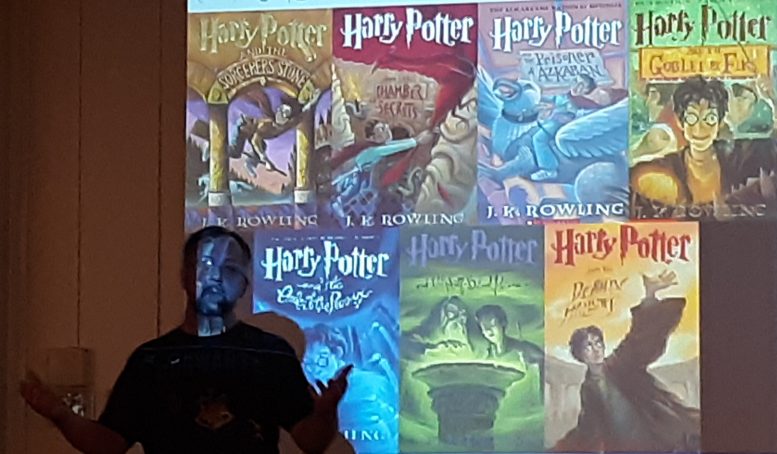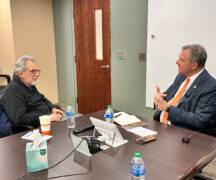By JAN LARSON McLAUGHLIN
BG Independent News
The “Harry Potter” series has had readers, regardless of their age, spellbound.
The magic of the series by J.K. Rowlings has lured countless devoted fans – while creating some critics who see the wizardry of Harry and his friends as too realistic. That perspective has led to the series being the most banned book series of the decade from 2000 to 2009.
In recognition of Banned Books Week last week, Dr. Ray Schuck, from Bowling Green State University’s Firelands campus, talked about “Harry Potter” at the Bowling Green campus.
His allegiance was clear from his “Hogwarts” T-shirt.
“This has become a tremendously successful popular culture phenomenon,” Schuck said. The books have sprouted “paraphernalia galore,” of which Schuck has collected Harry Potter glasses, a broom and wand.
The series that followed Harry through Hogwarts “defines a generation,” Schuck said.
“This was a cross-generational phenomenon as well,” he said, with many older addicts also being hooked on the magical books. “This is a big deal.”
The appeal stems from Rowlings’ storytelling ability, the author’s “irreverent sense of humor,” and the storyline that pits kids against powerful evil.
“It’s kids take on the world,” Schuck said.
But not everyone sees it that way. The popularity of the stories attracted countless young readers and their families. “So it also drew the attention of its critics,” Schuck said.
As Schuck was preparing his presentation on banned books, his topic’s relevance was revived when a Catholic school in Nashville, Tennessee, banned the “Harry Potter” series last month. The decision was made after consultation with exorcists in the U.S. and Rome, who agreed that the books contain actual curses and spells.
The school feared “readers would risk conjuring evil spirits,” Schuck said. Young readers would learn to cast spells and conjure up the dead, which would be a threat to the faith, the school leadership stated.
“This isn’t just the Catholic church,” Schuck cautioned. Some Christian and Muslim denominations share the concerns.
But those religious objections about the book containing authentic spells are just rubbish, he said.
“Rowlings made these things up,” Schuck said.
Some in the Catholic leadership have no concerns about Harry and his wizardry. In 2003, a member of the Vatican’s Council for Culture found no problem with fairies, magic and imaginary worlds, Schuck said.
“They help children see the difference between good and evil,” he said.
Rowlings herself has said that Christianity was an inspiration for the books. And practicing pagans have said that the magic in “Harry Potter” is not real, Schuck said.
The books have been compared to the writings of C.S. Lewis and J.R.R. Tolkien, which have roots in Christian beliefs.
“They are metaphors for things going on in greater society,” Schuck said.
Other critics have suggested banning of the “Harry Potter” series because they view it as anti-family.
“That to me is just odd,” Schuck said. The stories talk a great deal about families, with the Weasley family being a solid supportive rock for Harry, whose greatest desire is to have his parents back.
Overall, Schuck believes the “Harry Potter” series represents hope and self-sacrifice for others. In the battle between good and evil, self-sacrifice often leads to the greater good, he said.
That trait can be found in Schucks’ favorite character, Neville Longbottom, who shows uncommon courage against extreme odds to save his friends.
“He’s the character who makes me cry,” he said. “I start welling up every time I see that scene. The forces of good can conquer the forces of evil.”
And to those who see the magic for what it really is – “Harry Potter” offers hope.
“Harry Potter still offers a true articulation of hope,” Schuck said. “The books lend themselves to a multiplicity of interpretations. But to many folks, regardless of anything else, these books represent hope.”
The books have also acted as a gateway for many young readers who got hooked on books because of their love for Harry and Hogwarts.
“These have been stories that got people interested in reading literature,” Schuck said.
And that is where the true magic may lie.





